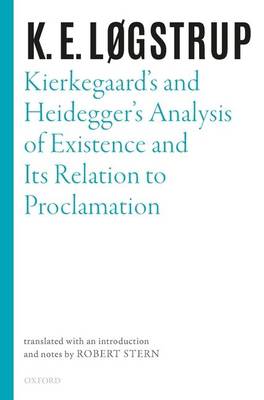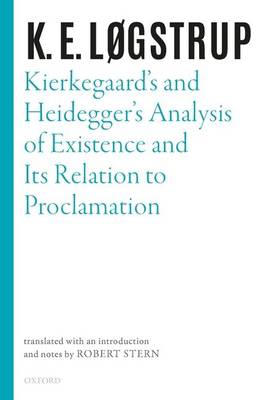
- Afhalen na 1 uur in een winkel met voorraad
- Gratis thuislevering in België vanaf € 30
- Ruim aanbod met 7 miljoen producten
- Afhalen na 1 uur in een winkel met voorraad
- Gratis thuislevering in België vanaf € 30
- Ruim aanbod met 7 miljoen producten
Zoeken
Kierkegaard's and Heidegger's Analysis of Existence and Its Relation to Proclamation
K E Løgstrup, Christopher Bennett, Jessica Leech, Joe Saunders, Mark Textor
€ 141,95
+ 283 punten
Omschrijving
The great Danish philosopher and theologian K. E. Løgstrup (1905-81) offers a distinctive assessment and comparative critique of two key thinkers in Kierkegaard's and Heidegger's Analysis of Existence and its Relation to Proclamation (1950). Løgstrup focuses on the central idea from Kierkegaard and Heidegger that our individuality and authenticity are threatened by 'life in the crowd' or 'das Man'. According to Løgstrup, Kierkegaard holds that the only way to escape the crowd is through a relation to an infinite demand which he nonetheless leaves empty, while Heidegger avoids offering any kind of ethics at all. Arguing against both philosophers, Løgstrup himself proposes an ethic which is not just a set of social rules, but which is also more contentful than Kierkegaard's infinite demand: namely, the requirement to care for the other person whose life is placed in your hands. This call to care for the other person becomes central to Løgstrup's position in his most famous publication The Ethical Demand (1956), so this earlier work, based on lectures given in Berlin, provides a crucial insight into the development of his thought. This is the first English translation of an original and compelling text by Løgstrup, rendered into accurate prose and paired with an introduction which explains the main themes and wider context of the work.
Specificaties
Betrokkenen
- Auteur(s):
- Vertaler(s):
- Uitgeverij:
Inhoud
- Aantal bladzijden:
- 160
- Taal:
- Engels
- Reeks:
Eigenschappen
- Productcode (EAN):
- 9780198855996
- Verschijningsdatum:
- 9/06/2020
- Uitvoering:
- Hardcover
- Formaat:
- Genaaid
- Afmetingen:
- 155 mm x 236 mm
- Gewicht:
- 385 g

Alleen bij Standaard Boekhandel
+ 283 punten op je klantenkaart van Standaard Boekhandel
Beoordelingen
We publiceren alleen reviews die voldoen aan de voorwaarden voor reviews. Bekijk onze voorwaarden voor reviews.











